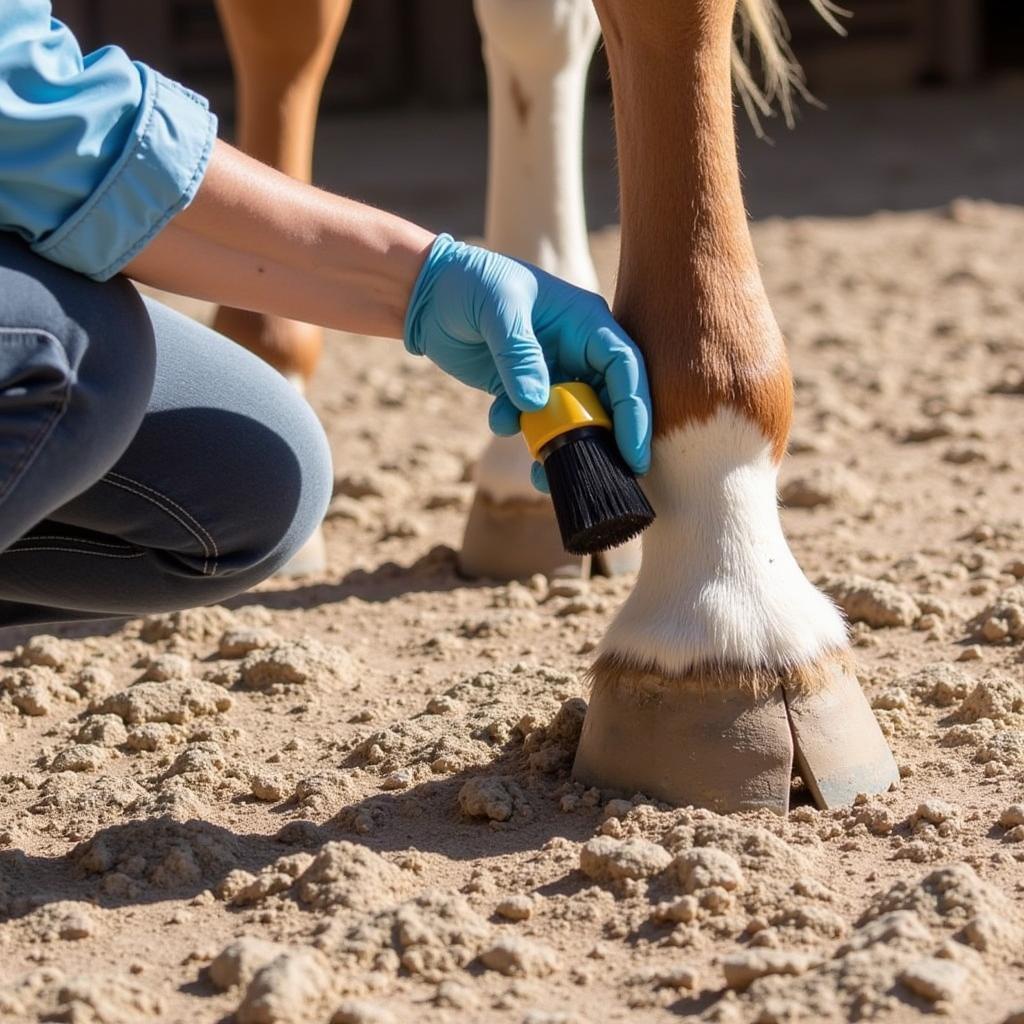Copper sulfate is a common ingredient in many hoof care products, but it’s also a topic of much debate among horse owners. While some swear by its benefits for treating thrush and strengthening hooves, others express concerns about its potential toxicity. So, what’s the truth about copper sulfate for horses’ hooves?
What is Copper Sulfate and How Does it Work?
Copper sulfate is an inorganic compound that appears as bright blue crystals. It has been used for centuries as an algaecide, fungicide, and even a medication in both human and veterinary medicine. When it comes to horse hooves, copper sulfate is primarily used for its:
- Anti-fungal properties: Copper sulfate is effective against various fungi, making it useful in treating thrush, a common bacterial infection of the frog.
- Astringent effects: It causes tissue contraction, helping to dry out moist areas in the hoof and harden the sole.
Benefits of Using Copper Sulfate for Horse Hooves
When used correctly and in appropriate concentrations, copper sulfate can offer certain benefits for hoof health:
- Thrush treatment: Copper sulfate is often the go-to treatment for mild cases of thrush. It helps control the fungal overgrowth and dry out the affected area, allowing the hoof to heal.
- Hardening the sole: For horses with thin soles or those prone to bruising, copper sulfate can help toughen the sole and improve resilience.
- Foot soaks: Copper sulfate solutions are commonly used for foot soaks, particularly after exposure to wet conditions, to prevent infections and harden the hooves.
“I often recommend copper sulfate foot soaks for horses prone to thrush, especially during wet seasons,” says Dr. Emily Carter, DVM, specializing in equine podiatry. “However, it’s crucial to use the correct dilution and avoid prolonged exposure.”
Risks and Precautions When Using Copper Sulfate
Despite its potential benefits, copper sulfate can be harmful if misused:
- Toxicity: Copper sulfate is toxic if ingested and can cause irritation upon direct contact with skin or eyes. Always wear gloves and protective eyewear when handling it.
- Tissue damage: Prolonged exposure to high concentrations of copper sulfate can damage hoof tissues.
- Environmental concerns: Dispose of unused copper sulfate solutions responsibly, as it can be harmful to aquatic life.
How to Use Copper Sulfate Safely and Effectively
The key to using copper sulfate safely and effectively is following these guidelines:
- Consult your veterinarian: Always consult your vet before using any new treatment on your horse, including copper sulfate. They can advise on the appropriate concentration, frequency, and duration of use based on your horse’s specific needs.
- Use the correct dilution: Never use undiluted copper sulfate on your horse’s hooves. Follow the instructions on the product label or your vet’s guidance for the correct dilution ratio.
- Apply sparingly: Apply a small amount of the diluted solution to the affected area using a brush or spray bottle. Avoid getting it on the coronary band or hair.
- Monitor for improvement: Observe your horse’s hooves regularly for signs of improvement or any adverse reactions. If you notice any worsening of the condition, discontinue use and contact your vet immediately.
 Applying copper sulfate solution to a horse hoof
Applying copper sulfate solution to a horse hoof
Alternatives to Copper Sulfate
Several alternatives to copper sulfate can be used for hoof care:
- Thrush treatments: There are many commercial thrush treatments available that utilize different active ingredients like iodine, chlorine dioxide, or natural antiseptics.
- Hoof hardeners: Products containing formaldehyde or other hoof-strengthening agents can be used as alternatives.
- Regular hoof care: Maintaining clean and dry hooves through regular picking, proper trimming, and balanced nutrition plays a vital role in preventing thrush and promoting healthy hoof growth.
Conclusion
Copper sulfate can be a useful tool for treating certain hoof conditions in horses when used correctly. However, it’s crucial to understand its potential risks and use it cautiously. Always prioritize your horse’s well-being by consulting your veterinarian for personalized advice and exploring alternative options when necessary.
For any concerns about your horse’s hoof health, contact us at Justus Horses USA. Our experienced team is available 24/7 to answer your questions and provide guidance on the best care practices for your equine companion. You can reach us at Phone Number: 0772127271, Email: [email protected] Or visit us at: QGM2+WX2, Vị Trung, Vị Thuỷ, Hậu Giang, Vietnam.